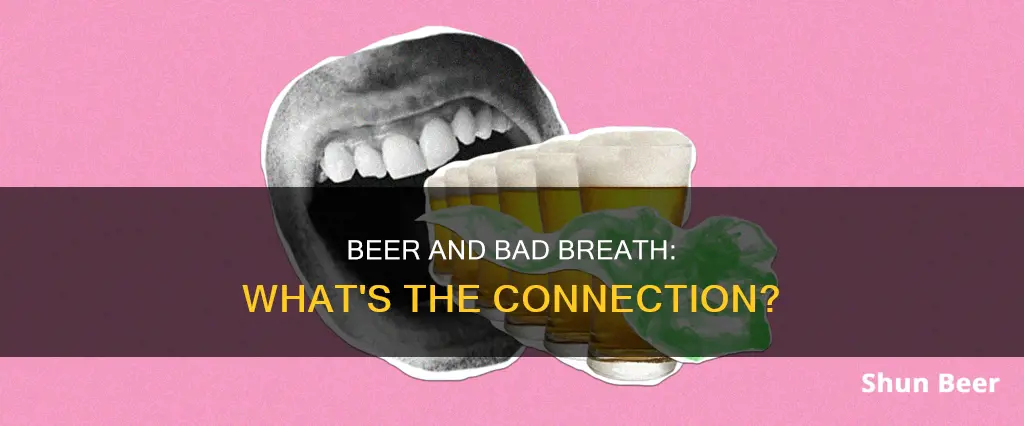
Alcoholic drinks like beer can often leave an unpleasant smell in the mouth, a phenomenon commonly known as alcohol breath. This occurs due to the presence of acetaldehyde, a pungent-smelling compound that forms when alcohol is metabolised by the liver. The compound lingers in the bloodstream and is eventually exhaled through the lungs, resulting in foul-smelling breath. Additionally, alcohol causes dehydration and reduced saliva production, creating an environment conducive to bacterial growth and further contributing to bad breath. While temporary remedies such as mouthwash, chewing gum, or drinking coffee may help mask the odour, the only effective way to eliminate alcohol breath is to wait for the body to fully metabolise the alcohol.
| Characteristics | Values |
|---|---|
| Cause of alcohol breath | Alcohol is broken down into different byproducts, one of which is acetaldehyde, a compound with a strong, pungent smell. |
| Alcohol causes dehydration and reduced saliva production, leading to dry mouth, which allows bacteria to build up and cause an unpleasant smell. | |
| How to get rid of alcohol breath | Wait for the alcohol to be fully metabolized by the body. |
| Use a travel oral care kit (toothbrush, toothpaste, floss). | |
| Sugar-free gums and mints can help get rid of alcohol breath on the go. | |
| Drinking more water can help counteract dehydration, prevent dry mouth, and rinse away foul-smelling bacteria and food debris. | |
| Temporary fixes | Mouthwash, cough drops, drinking coffee, chewing gum, etc. |
What You'll Learn
- Alcohol causes dehydration and dry mouth, leading to bad breath
- Acetaldehyde, a byproduct of alcohol, has a strong, pungent smell
- Temporary fixes include mouthwash, chewing gum, and drinking water
- Drinking coffee may mask the smell of alcohol
- Good oral hygiene and hydration are key to preventing bad breath

Alcohol causes dehydration and dry mouth, leading to bad breath
Alcohol causes dehydration and dry mouth, which can lead to bad breath. This is because alcohol, despite being a liquid, has a diuretic effect, reducing saliva production and causing dehydration. Saliva is essential for washing away bacteria in the mouth, so when there is less saliva, bacteria can build up and cause an unpleasant smell.
Dehydration caused by alcohol consumption can lead to a dry mouth, which is a common cause of bad breath. The diuretic effect of alcohol stimulates increased urine production, which can lead to dehydration if not properly managed. This, in turn, can cause the mouth to produce less saliva, leading to a dry mouth and an environment conducive to bacterial growth, resulting in bad breath.
Additionally, alcohol is broken down into by-products, including acetaldehyde, a compound with a strong, pungent smell. As acetaldehyde circulates in the bloodstream, it is eventually exhaled through the lungs, contributing to the smell of alcohol on the breath. This compound is also known to damage DNA and prevent the body from repairing this damage.
To counteract the dehydrating effects of alcohol and prevent dry mouth, it is recommended to increase water intake. Water can help dilute the strong smell of alcohol and prevent the dry mouth that contributes to bad breath. Eating before drinking can also slow the absorption of alcohol and reduce its smell. Foods high in fat and protein are particularly effective in this regard.
While temporary solutions such as mouthwash, chewing gum, or breath mints can help mask the odour of alcohol on the breath, they do not reduce alcohol levels in the bloodstream. The only way to truly eliminate alcohol and its effects on the breath is to wait for the body to fully metabolise it, which takes time. Responsible drinking and good oral hygiene practices are the best strategies for preventing and managing alcohol-related bad breath.
Beer Drinking: A Relaxing Indulgence or a Health Risk?
You may want to see also

Acetaldehyde, a byproduct of alcohol, has a strong, pungent smell
Alcohol is a common feature of many social events, but the unpleasant smell it leaves on your breath is less welcome. When you drink alcohol, it is broken down into different byproducts that are eliminated from your body in various ways. One of these byproducts is acetaldehyde, a compound with a strong, pungent smell.
Acetaldehyde is a colourless, volatile liquid with a boiling point of 21°C. It is soluble in water, chloroform, ethanol, and ether. It is produced in the body through the oxidation of ethyl alcohol, a process that can be achieved in a laboratory setting by using acidified potassium dichromate.
In the body, acetaldehyde is formed when ethyl alcohol vapours and a limited amount of air are passed over heated silver at 300°C. It can also be produced by the dehydrogenation of alcohol, where vapours of ethyl alcohol are passed over heated copper at 300°C.
As acetaldehyde travels through the bloodstream, it is eventually exhaled through the lungs. So, when you breathe out, you will be able to smell the acetaldehyde on your breath.
Acetaldehyde is known to be carcinogenic and can cause mutations in DNA. Long-term exposure, even at physiological concentrations, may impact cell activity. For example, physiological concentrations of acetaldehyde can influence cell proliferation in rabbit aortic myocytes after prolonged exposure.
While there are temporary fixes to mask alcohol breath, such as mouthwash, mints, and chewing gum, the only way to truly eliminate the smell is to give your body time to process and eliminate the alcohol.
Liquor Before Beer: Is It Safe to Mix?
You may want to see also

Temporary fixes include mouthwash, chewing gum, and drinking water
Alcohol causes bad breath because it is absorbed into the bloodstream and carried throughout the body, eventually reaching the lungs. As you exhale, some alcohol evaporates and is released as a gas, which contains volatile compounds that contribute to the noticeable odour of alcohol on your breath. One such compound is acetaldehyde, which has a robust, unpleasant smell.
Additionally, alcohol causes dehydration, leading to dry mouth, which can make the smell of alcohol more potent. When your mouth is dry, bacteria grows, making your breath smell bad.
Mouthwash
Gargling with an alcohol-containing mouthwash can help mask the smell of alcohol on your breath. While most mouthwashes will do the trick, an alcohol-based mouthwash will make it harder for others to notice the alcohol on your breath. This is because the alcohol in the mouthwash mingles with the alcohol on your breath, making it harder to distinguish. Brushing your teeth at the same time can also help increase freshness.
Chewing Gum
Chewing gum will not get rid of the smell of alcohol on your breath, but it will help to mask it until the gum loses its flavour. Chewing gum also has the added benefit of killing some bacteria and stimulating saliva production, which can help to clean and moisten the mouth.
Drinking Water
Drinking water is a great way to alleviate bad breath caused by alcohol consumption. Alcohol is a diuretic, which means it increases urine production and can lead to dehydration. Drinking water while consuming alcohol can help to counteract this effect, keeping your mouth moist and reducing the likelihood of bad breath. Water also washes away leftover particles that can contribute to odour.
Beer and Tylenol: Safe Mix or Not?
You may want to see also

Drinking coffee may mask the smell of alcohol
- Drinking lemon water
- Eating strong-smelling foods like onion and garlic
- Eating peanut butter
- Chewing minty gum
- Consuming tomato juice or soup
- Munching on herbs and spices like parsley and cinnamon
- Brushing your teeth with menthol toothpaste
- Flossing your teeth
- Gargling with mouthwash
- Taking a shower or bath
Remember, these methods only conceal the smell of alcohol and do not reduce your blood alcohol level. Responsible drinking and good oral hygiene practices are key to avoiding alcohol breath.
Actors Drinking Alcohol in Commercials: Is It Allowed?
You may want to see also

Good oral hygiene and hydration are key to preventing bad breath
Alcohol consumption can lead to bad breath, and while there are temporary fixes, the only surefire way to avoid it is to abstain from drinking. However, maintaining good oral hygiene and staying hydrated are key to preventing bad breath, especially since it can be caused by a variety of factors, including food, poor oral hygiene, and underlying health conditions.
Maintain Good Oral Hygiene
Good oral hygiene is essential for preventing bad breath. This includes brushing your teeth twice a day with fluoride toothpaste and flossing regularly to remove food debris and plaque buildup. Don't forget to clean your tongue, as this is often overlooked. Use a tongue scraper or your toothbrush to clean your tongue and prevent bad breath.
Stay Hydrated
A dry mouth contributes to bad breath by reducing saliva production, which naturally cleanses the mouth. Therefore, drinking water consistently is crucial to keeping your mouth moist and fresh. Staying hydrated becomes even more important when consuming alcohol, as it causes dehydration and reduces saliva production, leading to a dry mouth that promotes bacterial growth and results in bad breath.
Watch Your Diet
Certain foods, such as garlic and onions, are known to cause strong breath odors. Additionally, extreme low-carb diets can lead to halitosis as they cause your body to break down fats, resulting in the production of bad-smelling ketones.
Visit Your Dentist Regularly
If bad breath persists despite maintaining good oral hygiene, it is recommended to visit your dentist to rule out any underlying dental or medical causes, such as gum disease or infection. Regular check-ups can help detect issues early on and ensure optimal oral health.
Use Sugar-Free Gum and Mouthwash
Chewing sugar-free gum and sucking on sugar-free candy can stimulate saliva production, which helps wash away food particles and bacteria, reducing the risk of bad breath. Using an antibacterial mouthwash can also help reduce oral bacteria and provide longer-lasting fresh breath.
In summary, good oral hygiene and hydration are key to preventing bad breath. By following these simple steps and maintaining consistent oral care habits, you can effectively manage bad breath and maintain fresh breath and overall oral health.
Hot Beer: To Drink or Not to Drink?
You may want to see also
Frequently asked questions
Alcohol causes dehydration and less saliva production, leading to a dry mouth. Saliva is essential for washing bacteria out of the mouth, so a dry mouth allows bacteria to build up and cause an unpleasant smell.
The only way to completely get rid of the smell is to wait for the alcohol to be fully metabolised by your body. This can take several hours, depending on how much you've had to drink. In the meantime, you can try temporary fixes like drinking water, chewing gum, or using mouthwash.
The only surefire way to prevent alcohol breath is to not drink alcohol. If you do choose to drink, you can try to keep the smell to a minimum by drinking in moderation, alternating alcoholic and non-alcoholic drinks, and staying hydrated.
Alcohol contains a compound called acetaldehyde, which has a strong, pungent smell. As acetaldehyde travels around the bloodstream, it's eventually exhaled through the lungs, causing alcohol breath.







